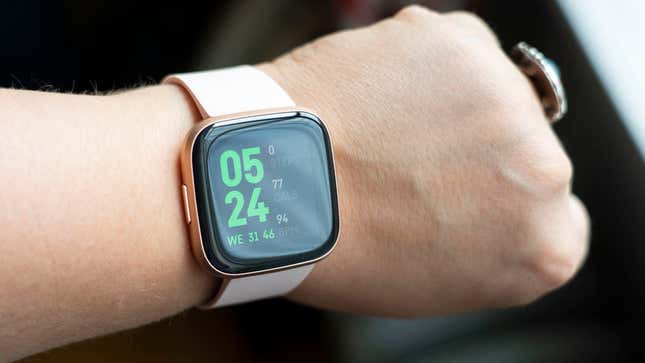
Since Google bought Fitbit, people seem to have fallen into one of two categories: Those who don’t care at all about the privacy implications, and those very much do. For the latter, it means this holiday season is a good chance to jump on sales and buy a replacement smartwatch or tracker. But which one?
While Gizmodo does have a pretty great buying guide (curated by yours truly), it features Fitbits in many of the categories. Because let’s face it, privacy concerns aside, Fitbit knows what it’s doing when it comes to hardware. Its software is also super streamlined and easy to use for general tracking. Only, while Fitbits is the shorthand term people use to describe this category of gadgets, they’re not the be-all, end-all.
A quick aside here: Privacy when it comes to your health data is a lot of smoke and mirrors. All these companies have published their own privacy policies, but many are also complicit in corporate wellness programs with employers and insurers. Using a tracker or smartwatch to monitor your health will require you to at least acknowledge that your information—albeit aggregated and anonymized—will be used for profit. It’s a definite tradeoff, but only you can decide whether, say, the convenience of tracking your period via your wrist is worth giving that sensitive data to any company at all. I’ve written about why it’s sort of hypocritical to be up in arms about Google owning Fitbit data when Fitbit’s already been profiting off it for years. That said, I get the legitimate concern. Plus there’s plenty of us out there who are irrevocably hooked in this self-quantifying game and want alternatives.
Many readers have commented this is why it’s a good time to jump ship for the Apple Watch. Apple has done a good job marketing itself as the One Company That Cares About Your Privacy. That’s sort of true. Apple is better than most, but again, it participates in corporate wellness programs too. And, if you participate in its research studies, you are consenting to give your data to third-parties of some sort. However, if you’re an iOS user looking for a smartwatch experience, the Series 5 is hard to beat. Its always-on display is better than the Fitbit Versa 2's, and recent software updates to the Health and Activity app have improved data contextualization on the platform as a whole.
But recommending the Apple Watch is also trite and leaves out the thousands of Android users. Plus, the Apple Watch starts at $400, which is expensive as hell unless you’re willing to opt for a discounted Series 3. To be clear, the Series 3 is still a great watch but doesn’t come with the latest display or ECG features. If you’re looking to replace a Versa, the Samsung Galaxy Watch Active2 is a decent choice. It is packed with fitness features, and Tizen OS is leagues better than Google’s WearOS. (Also, pretty sure the whole point of replacing Fitbits is to get away from Google, so...) I had accuracy issues when I tested it, but Samsung has updated its software since then.
But the most 1:1 competitor with Fitbit is probably Garmin. On the data front, you’ll get way more in-depth metrics and this past summer, Garmin finally updated its smartwatch line so it doesn’t look quite as hideous anymore. The Venu, its first AMOLED smartwatch, is pretty snazzy. Meanwhile, its hybrid analog Vivomove line is just plain gorgeous. There’s also the Vivosmart and Vivofit lines, which serve as basic trackers. One important note—particularly if you’re on a budget—almost all these options are more expensive than the corresponding Fitbits.
That brings me to the sea of cheap fitness trackers that have chipped away at Fitbit’s dominance over the last few years. While I think the Fossil Hybrid HR is a worthy successor to Pebble, many Pebble fans have since let me know that the Amazfit Cor or Amazfit Bip also fills the niche for simple, attractive trackers that don’t cost an arm and a leg. And I’d be remiss if I didn’t mention the Xiaomi Mi Band 4, which is stupid cheap at $40 and tracks basically everything the Fitbit Inspire HR does.
All these products have their individual quirks. Most don’t have the community aspect Fitbit does. So while challenges are built into some of them, like the Garmins, the devices just aren’t as ubiquitous. Fitbit’s app also doesn’t give you the most detailed stats—not to mention they’ve now started locking behind more meaningful data behind a subscription—but it is a well-designed app. Some of the others (especially budget options) are, well, still working on that. However, most of the smartwatches I mentioned are just as good, if not better, than the Versa. As for the basic trackers, they’ll give you a comparable experience with regard to accuracy—and that’s sort of the point, isn’t it?